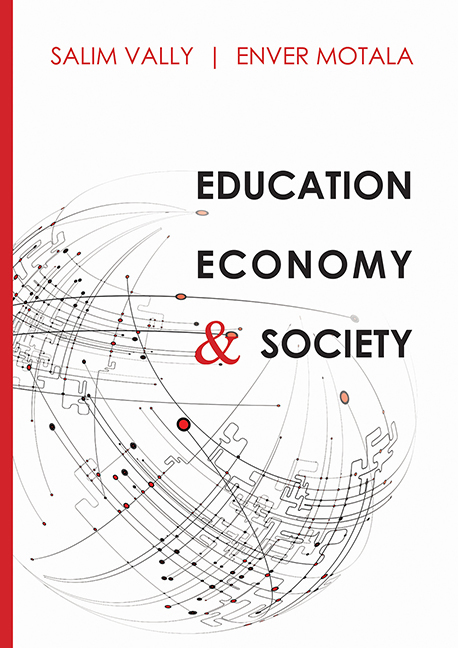Book contents
- Frontmatter
- Contents
- Foreword
- Preface
- About the contributors
- Acknowledgements
- Abbreviations and acronyms
- Chapter 1 ‘NO ONE TO BLAME BUT THEMSELVES’: Rethinking the Relationship between Education, Skills and Employment
- Chapter 2 EDUCATION AND ECONOMY: Demystifying the Skills Discourse
- Chapter 3 UNIVERSITIES AND THE ‘KNOWLEDGE ECONOMY’
- Chapter 4 GOING AROUND IN CIRCLES: Employability, Responsiveness, and the Reform of the College Sector
- Chapter 5 BUILDING A TRANSFORMATIVE PEDAGOGY in Vocational Education
- Chapter 6 SKILLS? WHAT SKILLS? JOBS? WHAT JOBS? An Overview of Research into Education/Labour Market Relationships
- Chapter 7 DEBATING THE NEXUS of Education, Skills and Technology in the Age of Lean Production: A Case Study of the ArcelorMittal Vanderbijlpark Plant
- Chapter 8 SKILLS, JOBS AND DECEPTION: Examples from the South African Workplace
- Chapter 9 ON THE USE AND ABUSE OF EDUCATION: Reflections on Unemployment, the ‘Skills Gap’ and ‘Zombie Economics’
- Chapter 10 THE YOUTH WAGE SUBSIDY in South Africa: Employment, Skills and ‘Churning’
- Chapter 11 EPISTEMIC INJUSTICE and the Struggle for Recognition: Human Dignity and the Recognition of Prior Learning
- Chapter 12 (RE)CLAIMING WORKERS' EDUCATION
- Chapter 13 SKILLS DEVELOPMENT in Post-Apartheid South Africa: Issues, Arguments and Contestations
- Index
Chapter 6 - SKILLS? WHAT SKILLS? JOBS? WHAT JOBS? An Overview of Research into Education/Labour Market Relationships
Published online by Cambridge University Press: 16 February 2020
- Frontmatter
- Contents
- Foreword
- Preface
- About the contributors
- Acknowledgements
- Abbreviations and acronyms
- Chapter 1 ‘NO ONE TO BLAME BUT THEMSELVES’: Rethinking the Relationship between Education, Skills and Employment
- Chapter 2 EDUCATION AND ECONOMY: Demystifying the Skills Discourse
- Chapter 3 UNIVERSITIES AND THE ‘KNOWLEDGE ECONOMY’
- Chapter 4 GOING AROUND IN CIRCLES: Employability, Responsiveness, and the Reform of the College Sector
- Chapter 5 BUILDING A TRANSFORMATIVE PEDAGOGY in Vocational Education
- Chapter 6 SKILLS? WHAT SKILLS? JOBS? WHAT JOBS? An Overview of Research into Education/Labour Market Relationships
- Chapter 7 DEBATING THE NEXUS of Education, Skills and Technology in the Age of Lean Production: A Case Study of the ArcelorMittal Vanderbijlpark Plant
- Chapter 8 SKILLS, JOBS AND DECEPTION: Examples from the South African Workplace
- Chapter 9 ON THE USE AND ABUSE OF EDUCATION: Reflections on Unemployment, the ‘Skills Gap’ and ‘Zombie Economics’
- Chapter 10 THE YOUTH WAGE SUBSIDY in South Africa: Employment, Skills and ‘Churning’
- Chapter 11 EPISTEMIC INJUSTICE and the Struggle for Recognition: Human Dignity and the Recognition of Prior Learning
- Chapter 12 (RE)CLAIMING WORKERS' EDUCATION
- Chapter 13 SKILLS DEVELOPMENT in Post-Apartheid South Africa: Issues, Arguments and Contestations
- Index
Summary
Introduction
The relationship between education and the economy is of ongoing concern around the world. Attaining ever-higher levels of education is widely believed to be essential for economic growth, and the idea of a ‘knowledge economy’ is frequently invoked, sometimes as an ideal to which people should aspire, and sometimes as an imminent reality. Livingstone and Guile (2012: iii) note that today the existence of a ‘knowledgebased economy’ is ‘widely taken for granted by governments, mass media, public opinion, and most scholars today. The idea of the ‘knowledge economy’ is a major contributor to contemporary questioning of the role of secondary education and the curriculum. This questioning has also, in part, been caused by the relatively recent and rapid expansion of secondary education internationally.
In South Africa, both the education system and the economy have particular problems, largely originating in the apartheid system. On the one hand, there are exceptionally high levels of unemployment (Marais 2011; Mohamed 2010). On the other hand, millions of young people leave the schooling system with inadequate education, and there is very little provision of education and training outside of the school and university systems (DHET 2012). A skills shortage is widely regarded as a major contributor to South Africa's high unemployment levels. In some quarters an allegedly inflexible labour market is also blamed, and it is sometimes seen as a paradox that South Africa can have both a skills shortage and high levels of unemployment. Young people frequently leave their education institution with no possibility of attaining a well-paying job, or, in many cases, any employment at all, in the context of pervasive structural unemployment in South Africa. More broadly, the South African economy has experienced what has commonly been referred to as ‘jobless growth’ with capital rather than labour intensive forms of economic growth being the order of the day (Mohamed 2010). This is coupled with a prevalent argument from employers that they cannot find people with the ‘right skills’. Policy makers and researchers question the suitability of school subjects and ‘traditional’ disciplinary bases for curricula in schools, and even more so in colleges, where new courses and programmes often are developed in the absence of a traditional disciplinary base, see Wedekind's chapter (Chapter 4) in this book for an elaboration.
- Type
- Chapter
- Information
- Education, Economy & Society , pp. 103 - 124Publisher: University of South AfricaPrint publication year: 2014



